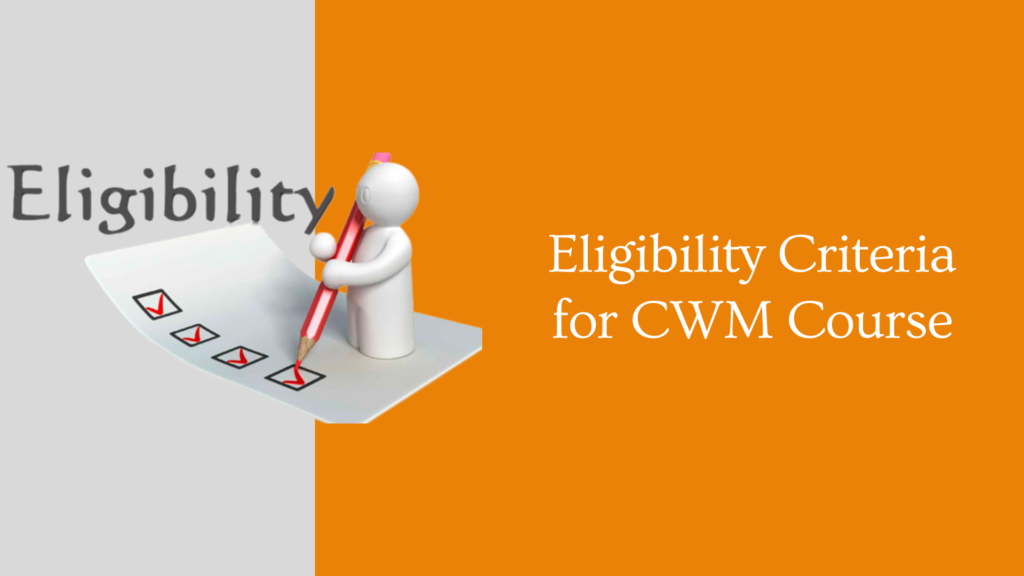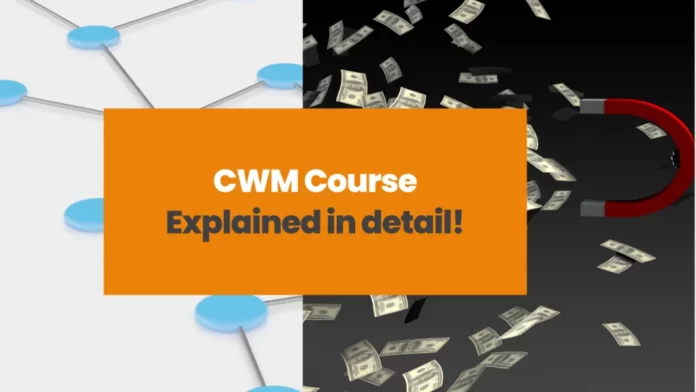Introduction
Are you looking to take your career to the next level and become a qualified financial expert? A CWM course could be the perfect way to do this. This highly sought after educational program is designed to provide students with the skills and knowledge necessary to excel in the world of finance.
Before embarking on your CWM journey, it’s important to recognize that there are certain eligibility criteria, entrance exams, and prerequisites that must be met in order to be considered for acceptance into the program. Those interested in pursuing a CWM course must possess an understanding of both business and personal finance, as well as being proficient in mathematics. Additionally, they must demonstrate excellent analytical and problem solving skills while also displaying a commitment to ethical business practices.
The CWM course syllabus is comprehensive and covers a wide range of topics related to wealth management, including investment analysis, portfolio management, financial planning for individual clients, securities regulations compliance, taxation issues, financial security products and services, retirement planning, risk management strategies and other key concepts related to establishing financial goals for individual clients or organizations. With such an expansive curriculum comes many job opportunities within the field of wealth management. A certificate holder can expect to find work as an investment analyst, portfolio manager or a corporate accountant among other positions.
In summary, A CWM course provides students with the knowledge necessary enter into or enhance their career within the field of wealth management. Those who wish to enter into this program should make sure that they meet all of its entrance criteria while also ensuring they have an understanding of various topics related to finance such as investments analysis and taxation issues. With successful completion of their studies holders can look forward exciting careers within this growing industry.
Eligibility Criteria for CWM Course

A CWM course can help advance your career in the financial industry and provide you access to lucrative job opportunities. But before going into the course, it is crucial to understand the eligibility criteria for enrolling yourself into the same.
Firstly, you should have a bachelor’s degree to become eligible for a CWM course that too from a recognized educational institution or have relevant experience in the field of investment management and financial services. If your entry qualifications don’t meet this criteria, then you may need to complete additional subjects as part of the entrance exam. This demonstrates that you possess the academic qualifications necessary for such a course. Also, knowledge of finance, economics and accounting is helpful when pursuing the course since this will give you an understanding of financial markets and investments.
Certificate in Wealth Management Entrance Exams
A CWM course requires an entrance exam before you can enroll. Talking about the exams, They are held every semester (depending upon study plan). The exams are usually project based but some universities may use live case studies during examinations to test candidates’ problem solving skills under pressure. The difficulty level of these exams can vary significantly depending on institution and your chosen specialization path within the CWM program such as Investment Analysis or Insurance & Risk Management etc. The entrance exams are typically multiple choice questions with some theory and practical components.
You must answer all the questions accurately to move onto the next stage, with those who get higher marks being preferred over lower scores. The theoretical portion will test your understanding of the major topics covered by your chosen program such as investment strategy, portfolio selection, asset allocation, regulation and compliance, asset class analysis etc. The practical section is designed to assess your mathematical skills as well as your problem solving abilities.
Knowing what to expect during the entrance exam is key to success at a CWM course program. Familiarizing yourself with the syllabus of your chosen program and researching job profiles are good steps for preparing for the exam.
CWM Course Syllabus
The syllabus offers a comprehensive overview of different topics including financial markets, portfolio analysis, risk management, and asset classes. The CWM course also provides valuable insight into investment strategies and alternative investments such as derivatives and private equity. To be successful in this program, we recommend that you have a basic understanding of these concepts before enrolling in the course.
Ensuring you have the right program, syllabus and skillset can be tricky, so let’s break down each component of the CWM course syllabus. The CWM course syllabus is highly varied and covers both theoretical and practical concepts. Subjects you will typically find on the syllabus include Financial Planning & Investment Strategies, Financial Services Law & Regulations, Global Economics & Business Ethics, Risk Management & Insurance Strategies and Alternative Investments & Portfolio Strategies. Depending on the university/institution offering the course, there may be additional subjects such as Retirement Planning Strategies or Real Estate Valuation & Investments among others.
The CWM course syllabus also includes topics ranging from fixed income securities to investment portfolios and portfolio optimization techniques to building efficient asset allocation strategies amongst many other subjects related to wealth management. This syllabus prepares aspiring wealth managers for careers such as Financial Analysts & Advisors, Investment Managers & Bankers, etc.
In addition to gaining theoretical knowledge through lectures and class discussions in each subject area, there is often a practical aspect incorporated into each CWM course syllabus featuring real life problems.
Skill Set Required for Certificate in Wealth Management

If you are considering taking a Certificate in Wealth Management (CWM) course, you should know that it is important to possess a strong skill set of industry knowledge. In order to complete the CWM course successfully, you must be comfortable with several different topics related to financial services and wealth management.
The first think is that you have a good technical understanding of the subject matter. This means a thorough knowledge of accounting principles, fundamentals of investments, legal and regulatory considerations, and the basics of economics. Also, having an understanding of behavioral finance can help you better understand how investors behave and make decisions when it comes to their finances.
Working knowledge of MS Office is important since most of the work done in wealth management requires its usage. You should also have strong problem solving and analytical skills which will enable you to quickly comprehend situations and act accordingly. Therefore, if you are looking to pursue a CWM course and secure a successful career in wealth management, it is important that you take stock of your qualifications and skill sets before enrolling yourself into one so that you can make sure everything checks out!
In addition to technical understanding, you should also be proficient in fundamental analysis. This means being able to assess stocks and other financial instruments based on their intrinsic values. Fundamental analysis involves analyzing financial statements in order to determine the potential return on any given investment opportunity. Having a basic understanding of this skill set will help set you up for success in the CWM course.
A major component of the CWM course is compliance and regulation, which is important for any financial advisor or wealth manager to understand fully. In this course you will be expected to analyze federal regulations related to investments as well as additional state level regulations if relevant For instance, when it comes time for you to propose solutions or products for your clients, it is essential that they abide by all applicable laws and regulations. Understanding these principles is essential for any financial service professional in today’s market.
The CWM exam also covers derivatives and portfolio management topics such as futures contracts, options trading strategies, various types of mutual funds, exchange traded funds (ETFs), asset allocation principles and risk management techniques.
In short, rhe skills required for successful completion of a CWM course varies but broadly includes financial knowledge and analytical aptitude; understanding of legal regulations related to finance; interpersonal skills; communication skills; data analysis skills; research capacity; organizational ability; problem solving capabilities; IT proficiency etc. Additionally, many programs also place emphasis on developing expertise in certain areas such as fixed income investments or insurance products among others.
Finally, effective communication skills are necessary as taking part in wealth management requires interfacing with clients as well as other financial professionals. Taking all these points into consideration, it’s clear that those interested in pursuing a Certificate in Wealth Management must possess certain qualifications and skill sets before they can apply for admission into such a course.
Job profiles after CWM Course

Completing a Certificate in Wealth Management, CWM course is a beneficial step for prospective professionals in the field of finance. With this qualification, you can look forward to gaining new skills in this domain, as well as a variety of job opportunities. In this part of the blog, we take a look at the job profiles after CWM, responsibilities and duties of CWM holders, salary expectations, and career growth prospects.
Upon completing your CWM course, you will be eligible for different job roles including financial advisor, asset manager, investment analyst, portfolio manager, and more. Depending on your role, your responsibilities and duties may include analyzing financial data and markets to make investment decisions; keeping updated on the latest news and regulations; giving advice on investments; developing strategies to maximize returns; managing portfolios; and providing clients with tailored financial services.
To make the most out of your CWM course it is important to have an understanding of the eligibility criteria before beginning studies. This includes having completed an undergraduate degree from any recognized university or institute with at least 45% marks or equivalent CGPA. You will also need to pass an entrance exam such as National Aptitude Test in Wealth Management (NATW) or Financial Planners Standard Board India Exam (FPSB). Additionally, knowledge of subjects such mathematics or economics is highly beneficial.
Importance of a Certificate in Wealth Management Course

The Certificate in Wealth Management (CWM) is a powerful tool for learning financial literacy and building career enhancing skills in the financial industry. It provides individuals with the knowledge, expertise and practical experience to succeed in the ever growing wealth management sector. The CWM course emphasizes on developing a comprehensive understanding of economic concepts and tools for investment analysis, as well as examining marketing strategies and portfolio construction. As you know, to meet the eligibility criteria for enrollment in the CWM program, you must possess an undergraduate degree and demonstrate the skill set required to become a successful financial professional.
The CWM course syllabus prepares you to tackle the numerous challenges in the financial field by imparting significant knowledge of modern principles of financial planning, management and product selection. By taking up this course, you will gain an overall understanding of economic concepts such as risk management, asset allocation, portfolio optimization, wealth taxation laws and capital market regulations. This can be further sharpened with hands-on training modules that teach you how to construct portfolios while taking into account various regulatory requirements as well as customer profiles and risk profiles.
The unique feature of CWM course is that it also offers extensive practice sessions which focus on simulating real world situations for better improvisation. This helps build a strong foundation of soft skills like communication, problem solving or decision making which hold importance when it comes to making sound decisions in the related field of work. One can also expect to gain proficiency in handling client portfolios efficiently through simulation trials and practice challenges available during their coursework duration.
Upon completion of the CWM course, students are equipped with requisite skills needed to pursue rewarding job opportunities in both private wealth management firms as well as banks/investment companies.
Benefits after completing CWM Course
A CWM course can provide you with an in-depth knowledge of wealth management and offer you the opportunity to build an extensive understanding of risk management and asset protection strategies. It can also equip you with the necessary skills to advise on complex financial planning matters such as international tax laws.
Now that you are aware. A CWM course will cover a range of topics including financial services regulations, portfolio management, private banking, alternative investments, estate planning, retirement planning and insurance products. Through your studies, you’ll be able to develop a bespoke approach to financial advising that takes into account an individual’s unique circumstances.
Once you have completed your CWM qualification, it can open up new job opportunities in various roles that involve wealth management within the finance sector. Popular career paths include:
- Financial Advisors
- Wealth Managers
- Registered Investment Advisors
- Insurance Brokers
- Asset Managers
- Private Bankers
- Tax Consultants
- Investment Bankers
Completing a CWM course will not only provide you with extensive knowledge on how best to advise clients but it will also assist in elevating your career prospects by building relationships with industry experts within your network as well as build credibility for yourself.
CWM Salary after Completing the Course

So what can be expected after completion of a CWM course? Well, the average salary that individuals receive will depend greatly on their job profile and industry. Generally speaking though, there’s great potential to earn good money so it’s worth considering if it sounds like something that might suit you.
The skills and knowledge gained through a CWM course are incredibly valuable. When starting out, most wealth managers would possess an understanding of financial data analysis; proficiency in frontend programming languages; and be highly experienced in collaboration tools such as Microsoft Excel and PowerPoint. These core skills make up the foundation of successful wealth management.
Other key subjects are portfolio composition strategies; asset allocation strategies; portfolio optimization strategies; economic indicators; taxation strategies; investments laws; market dynamics and fund structuring. On top of this, many CWM courses will also cover interpersonal skills such as how to effectively communicate with clients about their financial needs and goals.
If all these sound like areas that appeal to you – then enrolling onto a Certificate in Wealth Management may be well worthwhile! Upon completion of this program, those who have mastered its syllabus can look forward to lucrative salaries depending on their job profile and industry. In short, Certificate in Wealth Management holders can expect to earn salaries between Rs. 3 lacs to Rs. 20 lacs per annum depending upon their experience level and type of workplace they are employed in (such as banks or investment firms). Additionally, there are excellent growth prospects for CWM holders that have the potential to increase their salaries over time as they gain more experience within the industry.
Conclusion
Finally, Becoming a Chartered Wealth Manager (CWM) is a great career option for those who want to work in the financial industry in India. CWM is one of the most respected and sought-after financial designation in the world. It is a globally recognized professional credential that signifies expertise in wealth management.
There are many reasons why pursuing a career in wealth management is a good idea. For starters, it is a growing industry with immense potential. In India, the number of high net-worth individuals (HNIs) is on the rise, and this trend is expected to continue in the years to come. This means there will be increasing demand for wealth managers who can provide expert advice on how to grow and preserve wealth. Working as a wealth manager can be highly rewarding, both financially and professionally. Wealth managers typically earn high salaries and bonuses, and have the satisfaction of helping their clients achieve their financial goals.
In India, the job outlook for Chartered Wealth Managers (CWMs) is positive. The demand for CWMs is expected to grow in line with the country’s economic growth. With the expansion of the middle class and the rise in disposable incomes, more people are expected to invest in financial products and services. This will create opportunities for CWMs to provide advice and assistance to clients in making investment decisions. The number of jobs for CWMs is expected to grow at a rate of 7% per year between 2016 and 2026, according to the National Skills Development Corporation (NSDC). This growth is higher than the average growth rate for all occupations in India.
There is no doubt that the role of a Chartered Wealth Manager (CWM) is vital in today’s economy. They are responsible for providing financial planning and investment advice to clients, as well as managing their portfolios. However, with the current economic climate in India, there is a lot of uncertainty surrounding the future of CWMs.
The job market in India is highly competitive, and jobs are often filled by those with connections or who are willing to work for lower wages. This means that many CWMs are struggling to find work, or are working for significantly less than they could be earning in other countries. In addition, the Indian government has been slow to recognise the value of financial planning and investment advice. This has led to little regulation of the industry, which makes it difficult for CWMs to operate effectively.
Despite these challenges, there are still many opportunities for CWMs in India. The country’s population is growing rapidly, and there is an increasing demand for financial services. In addition, the Indian government is gradually starting to recognise the importance of financial planning and investment advice, and is introducing new regulations that will benefit CWMs. With its huge potential market and favorable government policies, India offers considerable scope for CWMs who are willing to take on the challenge.
Frequently Asked Questions (FAQs)
CWM is the best qualification a professional can achieve in the wealth management industry. Though CWM is difficult, candidates can take at least four attempts to clear it, so they should spend quality time studying.
Usually, The duration of a CWM program require 5 Months from a candidate to complete the program. Registration is valid for 1 Year. After 1 year the registration can be renewed by paying the renewal fees.
The curriculum of CWM course is relevant, practical, and exhaustible in nature which goes beyond CFP certification and also covers Global Financial System, Equity Analysis, PMS, Real Estate Valuation, Loan & Debt Management, Intergenerational Wealth Transfer, International Taxation, Relationship Management.
Students who are interested in pursuing the CWM program must register with AAFM India, an internationally-renowned institution for financial education and certification. Registration can be done through one of AAFM India’s authorized Education Providers or Corporate Members. This pathway is compulsory for those who wish to partake in the CWM program and gain its certifications.
The average salary of a certified wealth manager is INR 9.84 LPA. Besides being a wealth manager, the certificate holder can get a job as a portfolio manager.
The Certified Wealth Manager (CWM) designation is a prestigious professional certification issued by the GAFM Global Academy of Finance and Management. The GAFM was formerly known as the American Academy of Financial Management (AAFM). By earning this certification, individuals demonstrate that they have acquired the knowledge and expertise necessary to effectively manage wealth on behalf of their clients. This designation is highly sought after by wealth management professionals as it is seen as a mark of distinction in the field.





